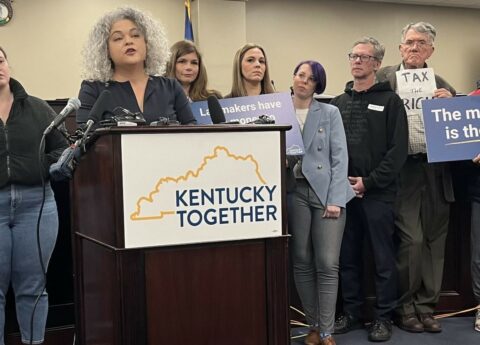New Report: “States Are Still Funding Higher Education Below Pre-Recession Levels”
Kentucky Going Against National Trend by Failing to Reinvest in Higher Education
Shortchanging public universities and colleges reduces access to higher education, hurts economy
While many states are beginning to reinvest in higher education after years of budget cuts since the recession hit, Kentucky ranks in the bottom 10 states in funding progress in 2014, according to a new report from the Center on Budget and Policy Priorities. What’s more, the additional 1.5 percent cuts in the budget the General Assembly just passed for 2015 will put Kentucky further behind even as other states restore funding.
The report shows that 40 states increased higher education funding per student by at least 1.6 percent between 2013 and 2014, including 26 states that boosted funding by at least 5 percent. Kentucky increased funding per student by only 0.3 percent between those years, and that small increase is caused by an estimated drop in student enrollment rather than an injection of new state dollars.
Kentucky’s failure to reinvest is on top of years of cuts. The state has reduced funding for higher education by 25.4 percent since 2008 when adjusted for inflation, a decrease of $2,649 per student, according to the report. The report shows that other states have made similarly deep cuts since 2008, but that most are beginning to reverse that trend.
“Smart investments in public colleges and universities can strengthen Kentucky’s economy,” said Ashley Spalding, Research and Policy Associate at the Kentucky Center for Economic Policy. “More education means greater skills, more entrepreneurship and an enhanced democracy. As other states restore funding to higher education, Kentucky risks being left behind.”
As a result of these cuts, tuition has risen dramatically and the quality of education has suffered, which will make it harder for the state to grow and attract businesses that rely on a well-educated workforce. The average tuition at a public, four-year college in Kentucky has increased by 23.2 percent or $1,636 since 2008, according to the report. The state’s Council on Postsecondary Education just approved a cap for tuition increases of 8 percent for public universities and 4 percent for community colleges over the next two years. When factoring in new agency bonds for construction projects that will be partially funded through student fees, community college costs can increase up to 10 percent.
When the recession hit in 2008 and tax revenue dropped, most states relied heavily on spending cuts rather than a more balanced mix of spending cuts and revenue increases. As a result, many states slashed funding for public colleges and universities. While most other states have begun to restore some of the cuts, states as a whole are still spending 23 percent less per student on higher education than they did in 2008, after adjusting for inflation.
As a result, tuition at four-year public colleges has grown nationally by 28 percent since the 2007-08 school year. Public colleges and universities across the country also have cut faculty positions, eliminated course offerings, closed campuses, shut down computer labs, and reduced library services.
“To reverse these trends, Kentucky needs to make higher education a bigger priority,” said Spalding. “Given the state’s budget situation, that will require raising additional revenue through tax reform. Instead, the 2014 General Assembly passed a small batch of tax breaks that will cost the state millions of dollars a year in future budgets.”
“States that are cutting taxes rather than investing in their colleges and universities are making the wrong choice,” said Michael Mitchell, policy analyst at the Center on Budget and Policy Priorities and author of the report. “States should focus on providing access to quality higher education that will prepare students to become the highly-skilled workers that tomorrow’s economy will demand.”
###
The Center’s full report can be found at: http://www.cbpp.org/cms/index.cfm?fa=view&id=4135.
The Kentucky Center for Economic Policy is a non-profit, non-partisan initiative that conducts research, analysis and education on important policy issues facing the Commonwealth. Launched in 2011, the Center is a project of the Mountain Association for Community Economic Development (MACED).



